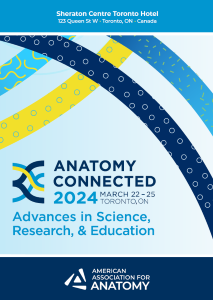Anatomy Education: Assessment, Curriculum & Mentoring Posters
Poster: Anatomy Education: Assessment, Curriculum & Mentoring Posters
114 - Exploring Perceptions of Alternative Assessment and Grading in Graduate Anatomy Education
Monday, March 25, 2024
10:15am - 12:15pm US EDT
Location: Sheraton Hall
Poster Board Number: 114
There are separate poster presentation times for odd and even posters.
Odd poster #s – first hour
Even poster #s – second hour
Co-authors:
There are separate poster presentation times for odd and even posters.
Odd poster #s – first hour
Even poster #s – second hour
Co-authors:
Sean McWatt, Ph.D. - Assistant Professor, School of Kinesiology, Western University
- ED
Emily L. Dietrich
Masters Candidate
Western University
Waterloo, Ontario, Canada
Presenting Author(s)
Abstract Body : Assessment and grading are hallmarks of education which have evolved to be strong extrinsic motivators that can increase academic stress. To address this and promote deeper learning, many instructors have implemented alternative approaches to assessment, including pass/fail designs, peer grading, and feedback-based assessment. Studies investigating the impact of these alternative assessment approaches report increased intrinsic motivation and decreased academic stress; however, those studies primarily examined summative evaluations at the undergraduate level despite higher stress levels among graduate students. The 9560 Gross Anatomy course at Western University offers a unique opportunity to explore how formative feedback-based assessment versus traditional quiz-based assessment influenced stress and motivation in graduate anatomy education.
Semi-structured student interviews (n = 9) aimed to discern student perceptions of the impact of assessment on academic stress, motivation, and perceived quality of learning, both in general and as related to the assessments used in the course. Instructors (n = 4) were also interviewed to establish the philosophies behind their chosen assessment style and determine how their responses compared to the perceptions of their students. Using a grounded theory approach, an inductive thematic analysis of each interview was conducted.
Analysis of student interviews generated the following themes related to assessment and grading: (1) communicating clear goals and expectations, (2) instructor approachability and individualized assessment, and (3) alignment between perceived effort and outcomes. Analysis of faculty interviews demonstrated intentions to: (1) promote non-technical, discipline independent skills, (2) provide authentic learning experiences, and (3) emphasize individualized assessment. The results indicated that misalignment between instructors’ goals and students’ experiences with assessment and grading in the course exacerbated students’ stress and detracted from their intrinsic motivation to learn. Feedback-based assessments were generally preferred, as they were perceived as more individualized and conducive to deeper learning.
This suggests that instructors should investigate ways to implement alternative approaches to assessment and grading while being mindful of constructive alignment. Further, clear communication and instructor approachability can cultivate stronger teaching presence, which may enhance motivation, engagement, and the quality of students’ learning outcomes. Implementing formative feedback-based assessments may, therefore, be an effective strategy to reduce academic stress and improve the learning experience for graduate-level anatomy students.
Semi-structured student interviews (n = 9) aimed to discern student perceptions of the impact of assessment on academic stress, motivation, and perceived quality of learning, both in general and as related to the assessments used in the course. Instructors (n = 4) were also interviewed to establish the philosophies behind their chosen assessment style and determine how their responses compared to the perceptions of their students. Using a grounded theory approach, an inductive thematic analysis of each interview was conducted.
Analysis of student interviews generated the following themes related to assessment and grading: (1) communicating clear goals and expectations, (2) instructor approachability and individualized assessment, and (3) alignment between perceived effort and outcomes. Analysis of faculty interviews demonstrated intentions to: (1) promote non-technical, discipline independent skills, (2) provide authentic learning experiences, and (3) emphasize individualized assessment. The results indicated that misalignment between instructors’ goals and students’ experiences with assessment and grading in the course exacerbated students’ stress and detracted from their intrinsic motivation to learn. Feedback-based assessments were generally preferred, as they were perceived as more individualized and conducive to deeper learning.
This suggests that instructors should investigate ways to implement alternative approaches to assessment and grading while being mindful of constructive alignment. Further, clear communication and instructor approachability can cultivate stronger teaching presence, which may enhance motivation, engagement, and the quality of students’ learning outcomes. Implementing formative feedback-based assessments may, therefore, be an effective strategy to reduce academic stress and improve the learning experience for graduate-level anatomy students.

